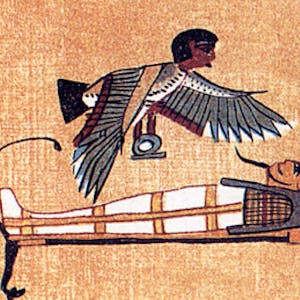Soul Beliefs Causes and Consequences - Unit 1 Historical Foundations
Throughout history, the vast majority of people around the globe have believed they have, however defined, a “soul.” While the question of whether the soul exists cannot be answered by science, what we can study are the causes and consequences of various beliefs about the soul and its prospects of surviving the death of the body. Why are soul and afterlife beliefs so common in human history? Are there adaptive advantages to assuming souls exist? Are there brain structures that have been shaped by environmental pressures that provide the foundation of body/mind dualism that is such a prominent feature of many religions? How do these beliefs shape the worldviews of different cultures and our collective lives? What is the role of competing afterlife beliefs in religion, science, politics, and war? This course explores several facets of this relatively unexplored but profoundly important aspect of human thought and behavior.The course consists mainly of 70 to 80 minute lectures, typically broken up into 3 segments, recorded from a course offered by Rutgers University School of Arts and Sciences. These videos include slides and some embedded video clips. Most lectures are accompanied by slides used during the lecture, also including recommended reading assignment which may provide additional opportunities to reflect on your studies.
Due to the lengthiness of this class and natural progression, the online course has been separated into 3 units, this is Unit 1.
None
Syllabus
Syllabus - What you will learn from this course
Week 1
Introduction to the Course
Week 2
What I was Told to Believe
Week 3
Historical Foundations of Soul Beliefs #1
Week 4
Historical Foundations of Soul Beliefs #2
Week 5
Historical Foundations of Soul Beliefs #3
Week 6
Functions of Religion in Ancient & Modern Times
Week 7
Reactions to Scientific Evidence
Week 8
Religions Under Attack
Week 9
Big Ideas & Big Controversies
Week 10
Darwin’s Dangerous Idea
Week 11
The Mind-Body Problem
FAQ
When will I have access to the lectures and assignments?
Access to lectures and assignments depends on your type of enrollment. If you take a course in audit mode, you will be able to see most course materials for free. To access graded assignments and to earn a Certificate, you will need to purchase the Certificate experience, during or after your audit. If you don't see the audit option:
What will I get if I purchase the Certificate?
When you purchase a Certificate you get access to all course materials, including graded assignments. Upon completing the course, your electronic Certificate will be added to your Accomplishments page - from there, you can print your Certificate or add it to your LinkedIn profile. If you only want to read and view the course content, you can audit the course for free.
Is financial aid available?
Yes. In select learning programs, you can apply for financial aid or a scholarship if you can’t afford the enrollment fee. If fin aid or scholarship is available for your learning program selection, you’ll find a link to apply on the description page.
Reviews
Fascinating, informative, thought provoking, makes you think. What more could you ask for from a Course? The Professors are wonderful. I'm so glad I choose to take this Course.
G
R
E
A
T
g
r
e
a
t
g
r
e
a
t
g
r
e
a
t
c
o
u
r
s
e
He's talky...but it's an entertaining flow :) and you actually learn a lot. You can tell both of them enjoy teaching this MOOC.
This is an eye opening course. However I'm not willing to give up my belief in my Catholic faith.
